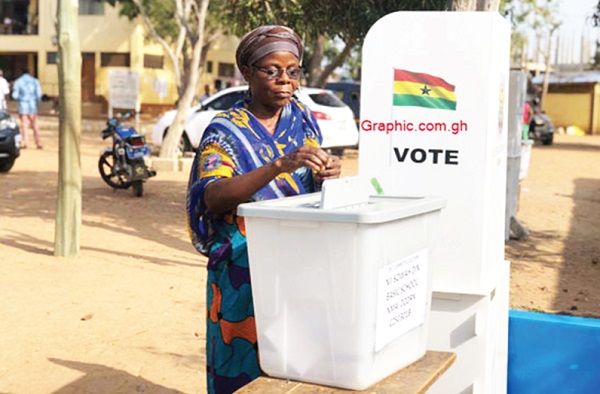On Election Day, what motivates the Ghanaian voter? How do they decide the political party that will gain their vote? These questions are likely to generate several varied responses.
Some may posit Ghanaians vote based on party sentiments. Then there is the school of thought that tribal sentiments motivate voters. Further, others will argue that issues – particularly the economic issues- are what drive Ghanaian voters.
To know exactly what motivates the Ghanaian voter, however, I believe the responses should be given directly by them. Let us take a look at what Ghanaian’s have said has been their driving force in their voting decisions, either pre- or post-election.
What Afrobarometer found out
In Round 7 (2017) of the Afrobarometer Survey, respondents were asked which presidential candidate they voted for in the most recent election (the 2016 election). As a follow up,
respondents were then asked for the main reason for the choice of presidential candidate. Ghanaians were split on the main reason with 43 per cent saying they voted for the candidate who could do a better job managing the affairs of the country with another 43 per cent saying it was the campaign promises and polices of the candidate.
Eleven per cent voted for a candidate because they belonged to the same party while one per cent chose the candidate they believed was likely to win, and two per cent because of shared ethnicity with the candidate.
CDD-Ghana found out
In the July 2016 pre-election survey, Ghanaians were presented with a set of factors and asked which of them was likely to influence their vote. The top three likely factors were bad roads (76 per cent), perceived corruption in government (75 per cent), and power outages (72 per cent). When the survey was repeated in October 2016, the top three likely factors were bad roads (69 per cent), perceived corruption in government (69 per cent), and ability to get medical care (67 per cent).
What NCCE found out
I have, on few occasions, referred to the National Commission on Civic Education election (NCCE) year surveys (Matters of concern to the Ghanaian voter). In 2016, when asked to provide reasons for which citizens were willing to vote in the election, the following were the top three reasons - exercise of civic responsibility (34 per cent), to change the government in power (22 per cent) and good polices and development projects (17 per cent).
In 2020, the top three reasons why Ghanaians voted were as follows – exercise of civic responsibility (31 per cent), development (21 per cent) and good government policies and programmes (19 per cent).
What Dr Isaac Owusu Mensah found out
In 2016, Dr Isaac Owusu Mensah (Department of Political Science, University of Ghana, Legon), conducted a pre-election survey in which he asked voters what would drive their choices in that election.
The study was conducted in five regions (Greater Accra, Central, Western, Brong Ahafo and Northern regions). The top three issues were the economy/jobs (36 per cent); education (26 per cent) and healthcare (15 per cent).
Another unique thing about that study was that, for the first time, a research study sought to measure empirically whether the running mate influences the choice of who to vote for as president. The results were mixed. In the Greater Accra and Northern regions, most respondents answered “yes”. In the Brong Ahafo and Central regions, majority of respondents answered “no”. In the Western region, there was a tie in the responses.
What will motivate Ghanaian voters in 2024?
From the above examples, one can conclude that a confluence of reasons drives the Ghanaian voter to the polls. I agree that there are civic engagement imperatives as found by the NCCE study. I also agree that there are bread and butter issues such as the economy, jobs, access to healthcare, etc. that motivates voters in an election.
It was a bit surprising though to see the percentage of Ghanaians who choose party affiliation as the main reason for choice of presidential candidate in the 2016 elections as per the 2017 Afrobarometer.
In 2016, the then opposition party, New Patriotic Party (NPP), put the economy centre stage and argued two things forcefully – a) that the incumbent had mismanaged the economy, and b) that it will take various policies and programmes to reset and restore the country. It came as no surprise that among those who said they voted for the NPP (Afrobarometer 2017), their main reason was the campaign promises, policies and programmes of the candidate.
How will the current opposition, National Democratic Congress (NDC), frame the 2024 election? It is quite clear that the economy will take centre stage again? Key party figures who regularly appear as guests on various television and radio shows argue two things forcefully a) that the incumbent has mismanaged the economy, and b) that it will take new leadership to reset and restore the country.
Something(s) will get Ghanaians to the polls in 2024. The economy will be one.
By Dr John Osae-Kwapong





